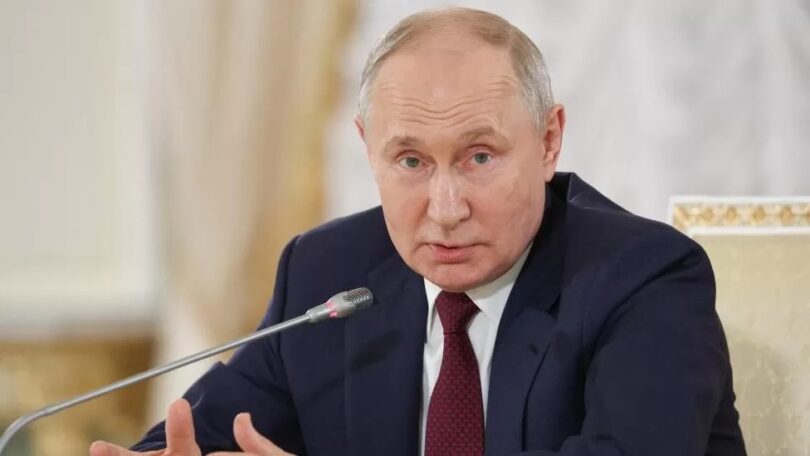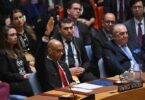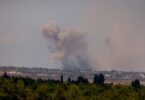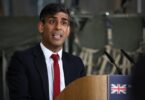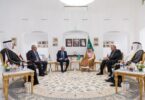Mark Galeotti
When Westerners talk about the conflict in Ukraine becoming a “forever war,” they tend to mean it as a bad thing. For Russian President Vladimir Putin, though, it likely is a goal.Last week, Putin made the date September 30 an official holiday: the inelegantly-named Day of Reunification of New Regions with the Russian Federation.
Marking the one-year anniversary of the annexation of Ukraine’s Donetsk, Luhansk, Kherson and Zaporizhzhia regions – even though most were not even in Russian control at the time – it provided an opportunity for Putin to return to one of his current obsessions: that this is a struggle “for the Motherland, for our sovereignty, spiritual values, unity and victory.”
This is not, in his eyes, a struggle with Ukraine so much as a global one with the West, in which Ukraine is just one battlefield, even if an especially bloody and obvious one. In his speech at the 2023 Victory Day parade, usually a lengthy and bombastic litany of successes, Putin was bleak and stark, declaring that “a real war has been unleashed against our homeland.” He raised the spectre of the Great Patriotic War – how the Russians describe the Second World War – and warned that “civilisation is again at a decisive turning point” because “Western globalist elites” were determined to “destroy and decimate” Russia.
On the one hand, this could be taken as an apocalyptic alibi for the relative failure of his so-called “special military operation” in Ukraine, in which what was meant to be a quick operation to impose a puppet regime instead became a bloody, full-scale war which has seen the flower of the Russian military destroyed. Yet it is more than that. When Putin talks of this as one of the “decisive battles for the fate of our Motherland,” as he did at this year’s Victory Day parade, he also seems to be speaking from the heart – and to the new creed of his regime. He was offering no clear vision of the future, nor even any real hope, just the message that the nation was locked in an existential struggle with a hostile West with no real end in sight.
This sounds like a grim prospect, but from Putin’s perspective it also has its clear virtues. Of course, the war is a catastrophe for Russia. US government sources suggest Russia may have suffered 120,000 killed and 170,000-180,000 wounded troops. The economic scarring will take years to heal even when peace has been agreed and sanctions are lifted. And the second-order effects on underfunded public services, even without the burden of large numbers of physically- and psychologically-damaged veterans, will be felt for at least the next generation.
But it is an opportunity, too. As the forever war becomes the organising principle of “late Putinism,” it excuses – even demands – the tightening grip of repression Putin needs to maintain his control of the nation. Even the mildest dissent becomes treason, and the massive shift in resources to the defence sector becomes a necessity. The latest budget envisages military expenditure increasing by almost 70% next year, to a level of something like three times the combined health, education and environmental protection spend. On the battlefield, Putin can tell himself that he wins by not losing. The Ukrainian counter-offensive has broken through the first Russian defensive line in the southern Zaporizhzhia region, and has already punched some local breaches in the second. Kyiv’s hope is that if it cannot cut the invading forces in two, it will at least get far enough to be able to shell the road and rail ‘land bridge’ links connecting Crimea with the Russian mainland.
As winter rains near, it is looking touch and go whether this will be possible. If not, Moscow will have a breathing space in which to build more defences, raise more troops and hope to see Western will to continue bankrolling Ukraine’s fight in this war diminish. We cannot know whether Putin genuinely believes that Russia can drag some kind of victory out of his Ukrainian debacle or simply feels he has no alternative but to hope he can outlast his enemies. However, from his point of view, talk of a “forever war” has one final virtue for him – it is demoralising to his enemies.
It is, after all, one thing to imagine a Ukrainian military victory on the back of the determination of its soldiers and the superiority of Western-provided equipment. Yet there is a real gap between that and a lasting peace. Even if every Russian soldier is pushed out of Ukraine – which would take some doing – then that simply moves the front line to the national border. Russia will still be able to rebuild its forces, launch drones and missiles at Ukrainian cities, and do what it can to impede reconstruction.
Meanwhile, while Putin’s handling of the July mutiny by Wagner chief Yevgeny Prigozhin and his mercenary army has left many within the elite uncertain whether he has lost his skill managing the system, Prigozhin’s subsequent untimely and suspicious death was seen as a stark warning to any not to challenge him. Sanctions are having a real effect on Russian defence production, but cannot prevent its escalation, nor is the economy facing collapse. Casualties do not seem to be deterring Russians from volunteering to fight, such that the General Staff is saying that it does not plan another mobilisation of reservists. No war lasts forever, but peace is still well over the horizon.
CNN

